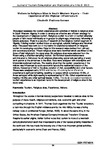Visitors to Religious Sites in South Western Nigeria – Their Experience of the Physical Infrastructure
| dc.contributor.author | Benson, E. I. | |
| dc.date.accessioned | 2018-06-21T12:52:37Z | |
| dc.date.accessioned | 2018-06-22T11:44:51Z | |
| dc.date.available | 2018-06-21T12:52:37Z | |
| dc.date.available | 2018-06-22T11:44:51Z | |
| dc.date.issued | 2013 | |
| dc.identifier.citation |
Benson, E. I. (2013) 'Visitors to Religious Sites in South Western Nigeria – Their Experience of the Physical Infrastructure', Journal of Tourism Consumption and Practice, 5(2), p.94-114 | en_US |
| dc.identifier.issn | 1757-031X | |
| dc.identifier.uri | http://hdl.handle.net/10026.1/11722 | |
| dc.description.abstract |
This paper assesses the tourism experience and activities of visitors to religious sites in South Western Nigeria, in order to develop an effective and efficient strategy for the development of religious tourism. Religious tourism is a form of tourism whereby people of faith travel individually or in groups for pilgrimage, missionary, fellowship or leisure purposes. There is a paucity of research on the religious tourism segment in Nigeria. Existing tourism studies focus on ecological, cultural, heritage and historical sites. The paper was born out of my desire for exploratory research on religious tourism in developing countries. Data for this research were derived from primary and secondary sources. Fifteen religious sites were identified which are linked to the three official religions in the study area. Six religious sites were selected from the fifteen using a stratified sampling method. Six hundred questionnaires were administered to visitors at the six religious sites using systematic sampling of every tenth patron at the entrances to the sites. Data were analysed with descriptive and inferential statistical methods. The results show that the tourism experience of the visitors was influenced by socio-economic factors like residential location of the visitors, frequency of visit to the sites, duration of visit, accessibility and other factors. These were analysed using SPSS and the top influencing factor of visitors’ experience is spiritual refreshing (seeking for peace) which constitutes 42.3%, of those surveyed while sight-seeing is represented by 37.5%. Other experiences are healing (10.3%) and other spiritual issues (4.3%). The study concludes that visitors’ tourism experience is an important factor in the development of religious sites in the study area. | en_US |
| dc.language.iso | en | en_US |
| dc.publisher | University of Plymouth | |
| dc.rights | Attribution-NonCommercial-NoDerivs 3.0 United States | * |
| dc.rights.uri | http://creativecommons.org/licenses/by-nc-nd/3.0/us/ | * |
| dc.subject | Tourism | en_US |
| dc.subject | Religious sites | en_US |
| dc.subject | Experience | en_US |
| dc.subject | Visitors | en_US |
| dc.title | Visitors to Religious Sites in South Western Nigeria – Their Experience of the Physical Infrastructure | en_US |
| dc.type | Article | |
| plymouth.issue | 2 | |
| plymouth.volume | 5 | |
| plymouth.journal | Journal of Tourism Consumption and Practice |



